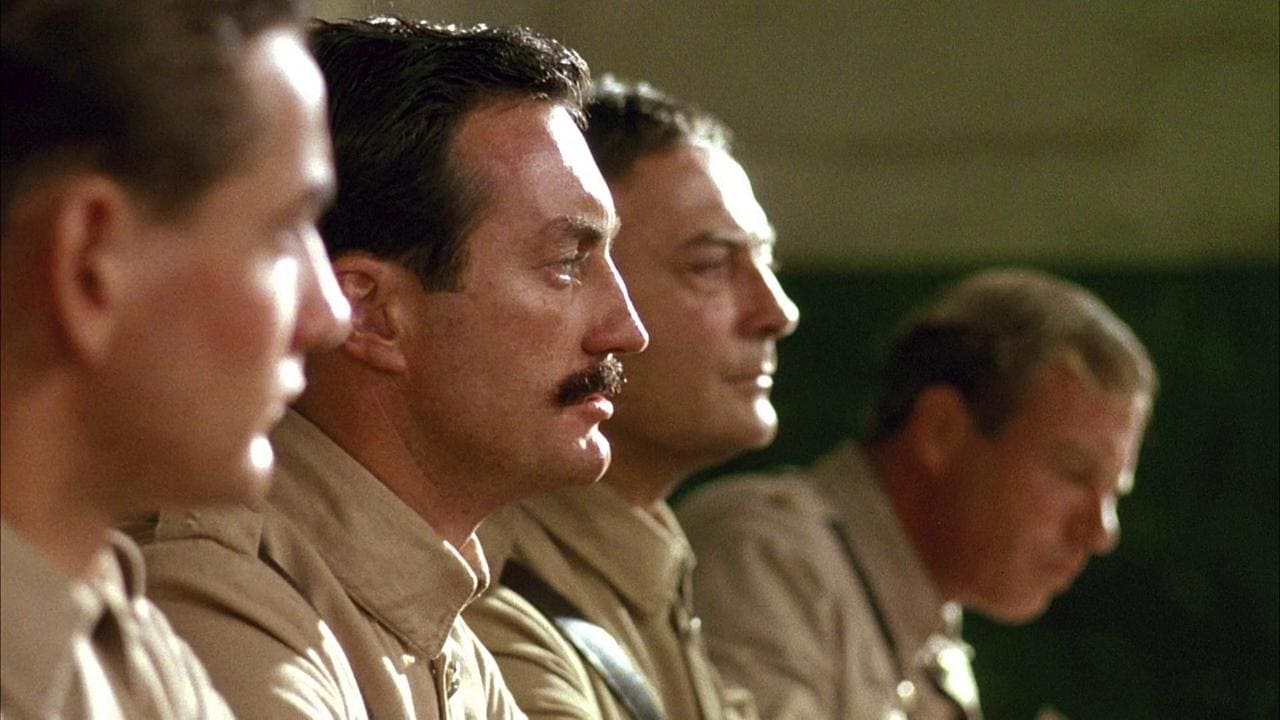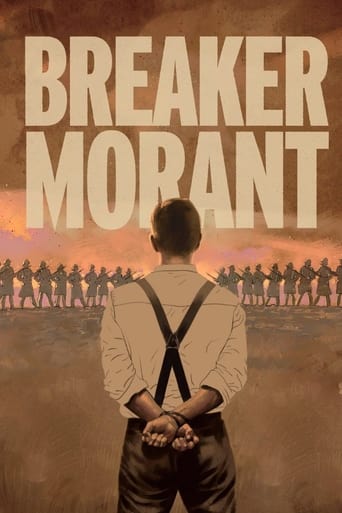

This Australian movie, based on Kenneth G. Ross' play, gives a dramatic account of a true situation that occurred during the Boer War. I liked it for several reasons: 1) It is a good courtroom drama. 2) It gave me (an American) more insight into what the Boer War was about and how it was fought. 3) It gives insight into ill-defined wars and the consequences for the troops that are asked to fight them with sloppy rules of engagement. 4) It is one of the most powerful anti-war movies I have seen. 5) Like other movies about the British colonial period, it shows The Empire in the process of its fall. The reasons for the Boer War (1899-1902) were complex. But, it started near the end of Victoria's reign and ended during the reign of her son, Edward VII. The Boers (mainly Dutch) were fighting for their independence and the British were fighting to maintain control over the British Empire. The Boers did not fight 'fairly' and the British were, in the end, forced to use Australian irregulars, the Bushvelt Carbineers, to implement some of the Boer's civilian-clad commando tactics. For example, these commandos would often abuse the white flag of surrender to suck in the unsuspecting British, only to be killed at close range. As the movie begins in 1901, three Australian, officers from the Bushvelt Carbineers, Lt. Harry 'Breaker' Morant (Edward Woodward), Maj. J.F. Thomas (Jack Thompson) and Capt. Alfred Taylor (John Waters), are brought before a British court martial for executing prisoners and killing a German minister. Under the direction of Lord Horatio Kitchener (Alan Cassell), these three soldiers were set up as scapegoats for tactics that had been used by other soldiers, on both sides. Also, in executing their duties, all three seemed to have received direct orders from 'higher ups.' To add insult to injury, their defense council had NEVER tried a case in court and was brought into the case only one day before the case began. Yet in spite of all of this, he mounts an unexpectedly brilliant defense for his clients. In fact, at one point he calls Kitcherner, himself, into the courtroom to testify. However, Kitcherner sends one of his subordinates to the court marshal to lie under oath. Also, the judge assigned to the case continually makes clearly incorrect pronouncements in response to objection calls. The viewer is left with an overwhelming feeling of frustration. The purpose of this "kangaroo court martial" was to prevent the Germans from entering the war on the side of the Boers—no one wanted the late Queen's grandson, Kaiser Wilhelm II, to side with the Boers. The court martial also made an example of the three Australians to hasten a peace treaty and end the war between the Boers and the British--a mere side show of the war. I like the structure of this movie, it is related during the trial with flashbacks with show what actually happened and why. The acting is also superb. So far, this is the one of best British colonial movies I have ever seen!
... View More"Breaker Morant" is a riveting courtroom drama, and one of the great tales of injustice during wartime. The 'Breaker' of the title refers to horse breaker; Harry Morant was known for his ability to induct wild horses into the service of the military.However, when one of his cohorts, Captain Hunt, is mutilated by Boer guerrillas in South Africa, he orders a firing squad of a group of prisoners who may or may not be responsible for the gruesome murder.The second Boer war was known as the "dirty war" for a reason. There were many crimes of war committed by the British forces. In the case of Morant and his two deputies, it seems scapegoating by the crown was the obvious cause for this bit of judicial hypocrisy. The movie is captivating and refreshingly unbiased. It doesn't turn a blind eye to the realities of war in which anything goes and superiors turn a blind eye whenever it suits them, but are quick to point the finger, and absent themselves, when called on it.It is ideally cast: Edward Woodward as the stiff upper lip Englishman, Jack Thompson as the incisive lawyer, Bryan Brown as the free living ladies man, but above all, the direction is exceptional. "Breaker Morant" is not only one of the best Australian movies; it's one of the best dramas ever made.
... View MoreThree Australian lieutenants are court martialed for executing prisoners as a way of deflecting attention from war crimes committed by their superior officers.I believe this is based on a true story, which makes it all the better. What we have is a classic tale of responsibility and leadership. Do soldiers have a responsibility to protect their leaders, even when the leaders are in the wrong and it could mean their death? This happens from time to time, and a recent example (as of 2015) are the incidents at Abu Ghraib. Should one be punished or following orders? And should those giving orders be held at fault? If yes, how far up the chain? Some of this, in different ways, goes back to the Nuremberg trials, and much earlier. The military and war do not work on the same principles as civilian life and the actions we take in our communities.
... View MoreReviewers have compared Breaker Morant with Paths of Glory, The Caine Mutiny and A Few Good Men, all involving courts martial. Suppressing my dislike of Kubrick, ignoring the naval jingoism spliced into The Caine Mutiny, and erasing the last 5 minutes of A Few Good Men, these weren't bad films. They were interesting, well-performed, raised provocative issues and all that. Breaker Morant, however, is everything those three are not. It's not in a different league, it's in a different dimension, stratospheric. It is real, as Woodward points out in his interview. It's visceral, gritty, organic, flawless. There's no Hollywood gloss, no pandering to the public, or vested interests. The other three movies are mechanical artefacts; you can see the machinery. Morant is dramatic art, at the topmost level. The editing is superb, the variation in scene after scene, close-ups, long-shots, is utterly masterful. Again, the dialogue, the sardonic humour, the tragedy, the irony, are all real. These men are rough and ready, in crumpled uniforms, truly in the field, on active service. There's no staging –-- well, there is, of course, it's a film --- but it just feels dead right, every time. It's not fancy. I'm reminded of what my boot camp drill sergeant told me, in 1956. This was a man who'd been busted two or three times, and who'd seen WWII in a British tank regiment, in the desert from Tobruk to Alamein. He told the rookie squad that the finest bunch of men he'd ever known were the Ozzies, and I've never forgotten that verdict. Anyone who gives this fabulous masterpiece less than ten stars needs his/her head examined.
... View More